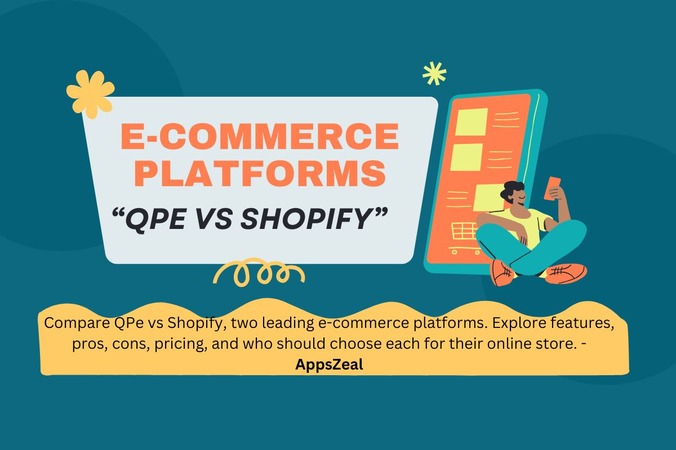Are you also thinking of building an e-commerce website to grow your business? When it comes to building an e-commerce website, we look for the most convenient and convenient or in other words the best e-commerce platform. It is important to consider the various e-commerce platform options before launching any e-commerce website. The two leading platforms in the e-commerce platform industry are QPe vs Shopify. Each platform brings unique features and benefits to suit different business needs.
QPe vs Shopify: A Brief Summary
QPe and Shopify are two popular e-commerce platforms, each with unique strengths. While Shopify is a globally recognized leader in the e-commerce space, QPe offers innovative features tailored for specific needs. Understanding their differences is essential to finding the right solution for your business.
| Feature | QPe | Shopify |
| Ease of Use | User-friendly, simple interface | Intuitive but with a steeper learning curve for customization |
| Pricing | Affordable, ideal for small businesses | Flexible plans, slightly higher for advanced features |
| Customization | Limited compared to Shopify | Highly customizable with themes and apps |
| Scalability | Good for small-to-medium businesses | Excellent for businesses of all sizes |
| Support | Dedicated support with personal touch | 24/7 support and extensive resources |
Why Choose QPe?
- Affordable Pricing: QPe offers cost-effective plans (plan starting at ~$10.99), making it ideal for startups and small businesses.
- Simplicity: Its straightforward interface ensures that even beginners can quickly set up and manage their online store.
- Integrated Features: QPe’s built-in tools reduce the need for third-party apps, saving time and money.
- Customer Support: Personalized and dedicated support helps resolve issues effectively.
Why Choose Shopify?
- Extensive App Ecosystem: Shopify provides access to thousands of apps to enhance functionality.
- Global Recognition: Trusted by millions of users worldwide, Shopify is a proven choice for e-commerce.
- Customizability: From themes to advanced plugins, Shopify offers unmatched flexibility.
- Scalability: Shopify’s robust infrastructure supports businesses of all sizes, including enterprise-level.
What to Check Before Choosing
- Budget: Consider the initial setup costs, monthly fees, and additional expenses for apps or plugins.
- Features Needed: Evaluate the features your business requires, such as payment gateways, shipping options, or marketing tools.
- Scalability: Think about the future of your business and whether the platform can grow with you.
- Technical Expertise: Check whether you need technical knowledge to manage the platform effectively.
Who Should Choose QPe?
- Startups and Small Businesses: QPe’s affordability and simplicity make it a great choice for those just starting.
- Businesses with Basic Needs: Ideal for sellers who don’t require extensive customization or third-party integrations.
Pros and Cons of QPe
Pros:
- Affordable pricing for small businesses
- Easy setup and user-friendly interface
- Integrated tools reduce dependency on third-party apps
Cons:
- Limited customization options
- Not ideal for large or complex stores
Who Should Choose Shopify?
- Established Brands: Perfect for businesses aiming for global reach and advanced e-commerce features.
- Large Inventory Stores: Shopify’s ability to handle large product catalogs and high traffic is unmatched.
- Customization Seekers: If your brand requires a unique store design, Shopify’s customization options are unparalleled.
Pros and Cons of Shopify
Pros:
- Highly scalable for businesses of all sizes
- Extensive customization options
- Access to a vast app marketplace
- 24/7 customer support
Cons:
- Higher pricing for advanced features
- Learning curve for customization
Final Thoughts: QPe or Shopify?
Choosing between QPe vs Shopify depends on your business needs:
- Opt for QPe if you’re a small business owner seeking affordability and ease of use.
- Choose Shopify if you’re looking for scalability, customization, and advanced features to support a growing business.
Evaluate your priorities, budget, and long-term goals to make the best decision for your online store.

